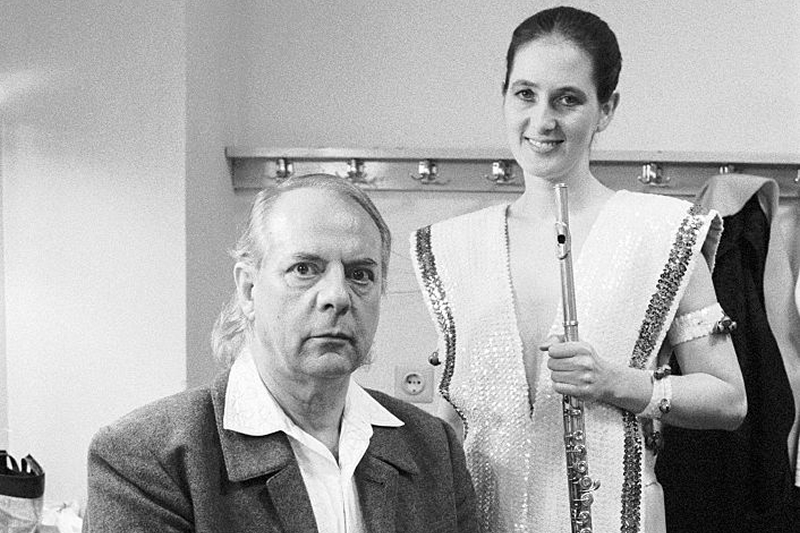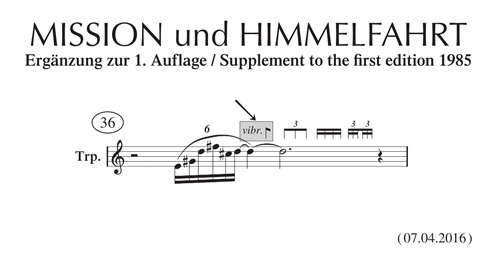
Zusatz MISSION und HIMMELFAHRT
Stockhausen Complete Edition on CD
Since 1991, a complete edition of all recordings in which Karlheinz Stockhausen has personally participated is being released on compact discs. Each CD in this series is identified by Stockhausen's signature followed by an encircled number. The numbers indicate the general historical order of the works.
Stockhausen realised the electronic music and participated in these recordings as conductor, performer, sound projectionist, and musical director. He personally mixed down the recordings, mastered them for CDs, wrote the texts and drew the covers.
- The compact discs may be obtained from the Stockhausen-Verlag: Kettenberg 15, 51515 Kuerten, Germany (www.stockhausenCDs.com).
Karlheinz Stockhausen
MISSION und HIMMELFAHRT (MISSION and ASCENSION)
Supplement about sound equipment and sound projection
In the preface of the score it says that "Starting at bar 120 both instruments
must by all means be amplified" To this instruction I would like to add that
only one microphone on a stand between the instruments has proven to work
the best. For this, ample time is needed to balance the instruments and to arrive
at a good mixture of the instrumental sounds. This is achieved by trying
out the various distances of each instrument from the microphone.
This microphone should be circuited to only one sliding fader in the
mixer, directly above which should be the knob for the left-right panorama
control. Therefore, a mixer is needed on which this pan pot is not further
away.
panorama
control. Therefore, a mixer is needed on which this pan pot is not further
away.
It is necessary to move the sliding fader up and down with the left hand
while simultaneously turning the pan pot to the left and right with the right
hand. The combination of these movements gives the impression that the
sound moves out of and back into the stage elliptically from close (loud) to
far away (soft).
Therefore, the movement should always be smooth.
At Rauschen / rushing
noise (bars 130, 135– 136, 139), Flatterzunge / flutter-tongue (bars 131– 132), Kußgeräuschen / kissing-noises (bar 132) and clicks (bar 134), the sound should fly by at close proximity (loud). The reversal of the
circular movements (clockwise  / counter-clockwise
/ counter-clockwise  ) should correspond
to the sections of the music, if possible.
) should correspond
to the sections of the music, if possible.
The instruction "They both very slowly and calmly fly at the ceiling of
the auditorium", means that since the first quasi concert performances of
MISSION und HIMMELFAHRT I have gradually increased the speed of
the rotation in bar 155 (alternating clockwise and counter-clockwise) reaching
very fast and very irregular fast movements of both the fader and
knob at the climax (end of the 2nd line), then very gradually slowed down
the rotation ending in a stand-still in the front middle before the final fermata.
Three recordings serve as examples of my movements: MICHAELs REISE /
MICHAEL'S JOURNEY on CD 30 B and MISSION und HIMMELFAHRT
/ MISSION and ASCENSION on CD 32 B of the Stockhausen
Complete Edition, as well as the Soloist’s Version of MICHAELs REISE on
the ECM CD, series 1406, released in 1992.
The sound projectionist should learn to exactly imitate these examples,
before he tries out his own version.
In order to practice these spatial projections, one must make a monophonic,
well-balanced recording of bar 121 to the end, and regulate this stereophonically
using two loudspeakers and a small mixer, record the regulation of
the movements stereo and compare with my examples. This should be repeated
until satisfactory results are achieved. In an auditorium, changes naturally
have to be made during rehearsals and performances according to the
given acoustics, but at least one is well prepared for this task, which is not
easy.
In any case, a new awareness for the responsibility and art of spatial projection
must be developed. Listeners judge music according to how it sounds
in space. Sound projection must be as carefully practiced as the playing of
the sounds.
Stockhausen, March 23rd 1998
